The Frozen Fruit Bars Market is estimated to be valued at USD 17.4 million in 2025 and is projected to reach USD 35.8 million by 2035, registering a compound annual growth rate (CAGR) of 7.5% over the forecast period.
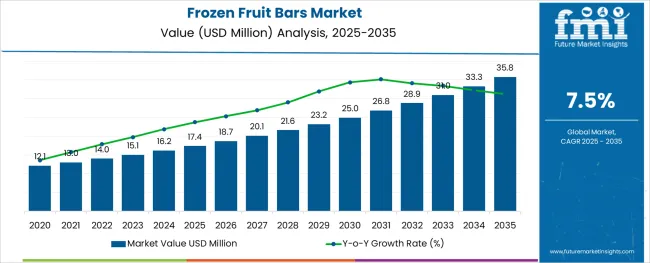
The frozen fruit bars market is expanding steadily, fueled by increasing consumer demand for convenient and healthier snack options. Consumers are gravitating toward fruit-based frozen treats that provide natural flavors and perceived nutritional benefits. The popularity of clean-label and natural food products has supported growth in conventional frozen fruit bars, which use familiar ingredients without artificial additives.
Product innovation in flavor profiles and packaging has attracted a broad demographic, especially among health-conscious and younger consumers. The market has also benefited from expanding distribution through supermarkets and convenience stores that emphasize fresh and frozen snacks.
Seasonal demand and rising awareness of fruit-based snacks as better-for-you alternatives are expected to sustain growth. Segment leadership is anticipated to be driven by the Original product type, Conventional nature, and Mango flavor, reflecting consumer preferences for classic, natural, and tropical taste experiences.
The market is segmented by Type, Nature, Flavor, and Distribution Channel and region. By Type, the market is divided into Original and Low Fat. In terms of Nature, the market is classified into Conventional and Organic. Based on Flavor, the market is segmented into Mango, Citrus, Pineapple, Grape, Apple, Berry, Coconut, Mixed Fruit, and Others.
By Distribution Channel, the market is divided into Hypermarkets/ Supermarkets, Specialty Stores, Convenience Stores, and Online Retail. Regionally, the market is classified into North America, Latin America, Western Europe, Eastern Europe, Balkan & Baltic Countries, Russia & Belarus, Central Asia, East Asia, South Asia & Pacific, and the Middle East & Africa.
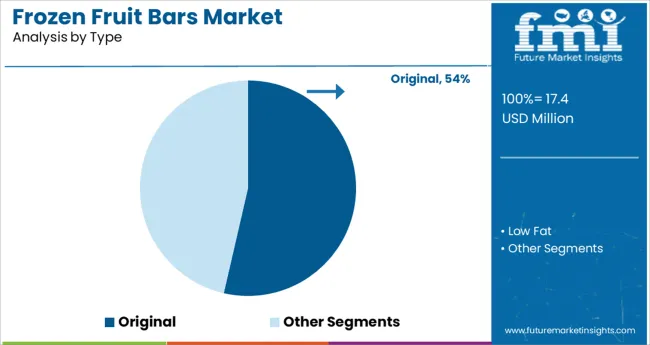
The Original segment is projected to hold 53.6% of the frozen fruit bars market revenue in 2025, maintaining its lead among product types. Growth in this segment has been fueled by consumer trust in traditional fruit bar formulations that emphasize natural fruit content and simple ingredient lists.
Buyers have shown preference for original recipes that offer authentic fruit taste without additional sugars or artificial flavors. The segment benefits from broad appeal as it meets the demand for wholesome, uncomplicated snacks suitable for all age groups.
Brand loyalty toward original variants is strong due to consistent flavor and quality. As consumers continue to seek transparency and naturalness in their snack choices, the Original segment is expected to sustain its dominant market position.
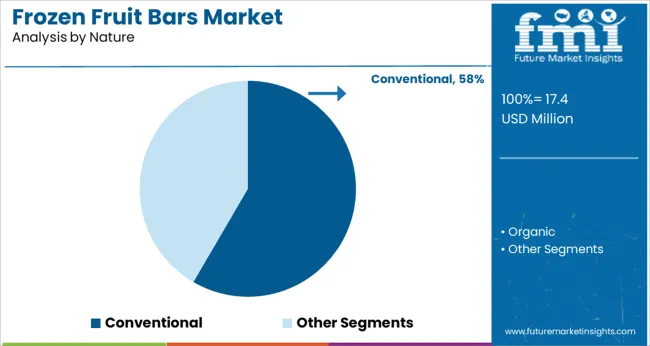
The Conventional segment is expected to account for 58.4% of the frozen fruit bars market revenue in 2025, leading the nature-based classification. Conventional frozen fruit bars have retained popularity due to their familiar taste profiles and widespread availability.
The segment benefits from established production methods that ensure consistent product quality and cost efficiency. Retailers continue to stock conventional variants extensively, supported by steady consumer demand.
While natural and organic alternatives gain traction, the conventional segment remains favored for accessibility and affordability. Its dominance is reinforced by consumers who prioritize taste and price over certification labels. With ongoing product improvements focusing on ingredient quality and sourcing, the Conventional segment is positioned for sustained growth.
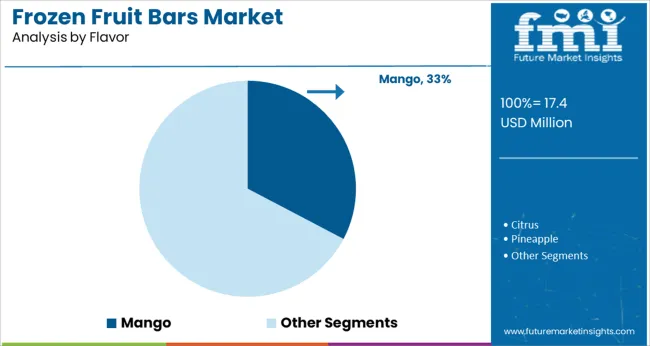
The Mango flavor segment is projected to capture 32.7% of the frozen fruit bars market revenue in 2025, positioning it as the leading flavor choice. Mango’s widespread appeal stems from its tropical sweetness, vibrant color, and association with natural freshness.
Consumer preferences for exotic and fruity flavors have made mango a staple in frozen fruit snack categories. The flavor’s versatility allows for easy blending with other fruits and functional ingredients, enhancing product variety.
Marketing efforts often highlight mango’s health benefits such as vitamins and antioxidants, which resonate with health-conscious buyers. Seasonal availability and consistent flavor quality have contributed to strong repeat purchases. As interest in flavorful yet healthy snacks continues, the Mango flavor segment is expected to maintain its leadership position.
Surging demand for innovative flavors amongst consumers and growing availability of a new range of frozen fruit bars with exotic new flavors such as kiwi, lime & raspberry mix flavors, coconut water with banana flavor, and others, is spurring the sales in the market.
These new additions of exotic and seasonal fresh fruit flavors in the collection of frozen fruit bars and shifting consumer interest in frozen snacks due to increasing global temperature is bolstering the demand in the frozen desserts
Hence, leading manufacturers of frozen fruit bars are emphasizing on expanding their production capacity. Also, some of the market players are aiming at entering into partnerships with large retail chains stores and mega marts such as Tesco plc, Walmart, Reliance Mart, and others to cater to the surging demand and increasing products availability. This is anticipated to augment the growth in the global market.
The burden of lifestyle diseases such as diabetes, obesity, and others is growing at a rapid pace across the world. For instance, according to the International Diabetes Federation, around 35.8 Million adults from the age of 20 to 79 years have diabetes worldwide, the number is projected to reach 643 million by 2035-end.
Due to this rise in prevalence of lifestyle diseases, consumers across the globe are consciously declining the consumption of sweet products and adopting natural fruits rather than processed fruit products. This is projected to hinder the sales of frozen fruit bars in the global market.
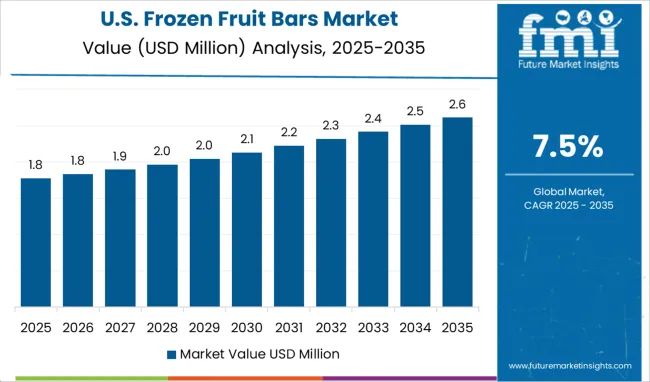
FMI states that North America is anticipated to exhibit the fastest growth in the global frozen fruit bars market during the forecast period 2025 to 2035.
Rising trend of adopting nutritious and healthy snacks amongst the health-conscious population and growing consumer inclination towards consuming fresh fruit-based products is propelling the demand for frozen fruit bars. Hence, leading players in the market are aiming at launching low-fat and low sugar products to cater to the surging demand.
For instance, in 2024, Enlightened, a USA-based brand of frozen food announced introducing a new functional frozen fruit bar, Fruit Infusion, with adaptogens and 70%-80% less sugar than other fruit bars. A slew of such development is estimated to accelerate the sales in the North America market.
Future Market Insights states that East Asia is estimated to account for a significant share in the global frozen fruit bars market between 2025 and 2035.
Over the past couple of years, a significant rise in prevalence of lactose intolerance is being witnessed across East Asia, creating strong demand for frozen lactose-free desserts. For instance, according to a report by the ProCon Organization, nearly 73% of the population in Japan and 85% of the population in China were reported to be lactose intolerant in the year 2024.
Attributed to this, customers with lactose intolerance are increasingly adopting desserts such as frozen fruit bars rather than milk-based ice creams, owing to their lactose-free properties, low calorie, and high nutritional value. This is projected to augment the frozen fruit bar sales across the East Asia market.
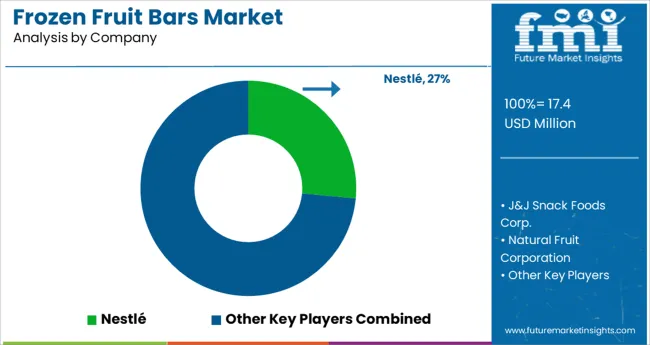
Some of the leading players in the frozen fruit bars market are Natural Fruit Corporation, Ice Pop Factory, Modern Pop, Nestlé S.A. (Outshine Brand), Eclectic Food Services Inc., J&J Snack Foods Corp., Unilever plc (Fruttare Brand), Andrades Desserts, Solero, and others.
Prominent players in the global frozen fruit bars market are aiming at launching novel products and capacity expansion to gain edge in the highly competitive market.
| Report Attribute | Details |
|---|---|
| Growth Rate (2025 to 2035) | CAGR of 7.5% from 2025 to 2035 |
| Base Year for Estimation | 2024 |
| Historical Data | 2020 to 2024 |
| Forecast Period | 2025 to 2035 |
| Quantitative Units | Revenue in million and CAGR from 2025 to 2035 |
| Report Coverage | Revenue Forecast, Volume Forecast, Company Ranking, Competitive Landscape, Growth Factors, Trends and Pricing Analysis |
| Segments Covered | Type, Nature, Flavor, Distribution Channel, Region |
| Regions Covered | North America; Latin America; Europe; East Asia; South Asia; Oceania; Middle East and Africa |
| Key Companies Profiled | Natural Fruit Corporation; Ice Pop Factory; Modern Pop; Nestlé S.A. (Outshine Brand); Eclectic Food Services Inc.; J&J Snack Foods Corp.; Unilever plc (Fruttare Brand); Andrades Desserts; Solero; Others |
| Customization | Available Upon Request |
The global frozen fruit bars market is estimated to be valued at USD 17.4 million in 2025.
It is projected to reach USD 35.8 million by 2035.
The market is expected to grow at a 7.5% CAGR between 2025 and 2035.
The key product types are original and low fat.
conventional segment is expected to dominate with a 58.4% industry share in 2025.






Our Research Products

The "Full Research Suite" delivers actionable market intel, deep dives on markets or technologies, so clients act faster, cut risk, and unlock growth.

The Leaderboard benchmarks and ranks top vendors, classifying them as Established Leaders, Leading Challengers, or Disruptors & Challengers.

Locates where complements amplify value and substitutes erode it, forecasting net impact by horizon

We deliver granular, decision-grade intel: market sizing, 5-year forecasts, pricing, adoption, usage, revenue, and operational KPIs—plus competitor tracking, regulation, and value chains—across 60 countries broadly.

Spot the shifts before they hit your P&L. We track inflection points, adoption curves, pricing moves, and ecosystem plays to show where demand is heading, why it is changing, and what to do next across high-growth markets and disruptive tech

Real-time reads of user behavior. We track shifting priorities, perceptions of today’s and next-gen services, and provider experience, then pace how fast tech moves from trial to adoption, blending buyer, consumer, and channel inputs with social signals (#WhySwitch, #UX).

Partner with our analyst team to build a custom report designed around your business priorities. From analysing market trends to assessing competitors or crafting bespoke datasets, we tailor insights to your needs.
Supplier Intelligence
Discovery & Profiling
Capacity & Footprint
Performance & Risk
Compliance & Governance
Commercial Readiness
Who Supplies Whom
Scorecards & Shortlists
Playbooks & Docs
Category Intelligence
Definition & Scope
Demand & Use Cases
Cost Drivers
Market Structure
Supply Chain Map
Trade & Policy
Operating Norms
Deliverables
Buyer Intelligence
Account Basics
Spend & Scope
Procurement Model
Vendor Requirements
Terms & Policies
Entry Strategy
Pain Points & Triggers
Outputs
Pricing Analysis
Benchmarks
Trends
Should-Cost
Indexation
Landed Cost
Commercial Terms
Deliverables
Brand Analysis
Positioning & Value Prop
Share & Presence
Customer Evidence
Go-to-Market
Digital & Reputation
Compliance & Trust
KPIs & Gaps
Outputs
Full Research Suite comprises of:
Market outlook & trends analysis
Interviews & case studies
Strategic recommendations
Vendor profiles & capabilities analysis
5-year forecasts
8 regions and 60+ country-level data splits
Market segment data splits
12 months of continuous data updates
DELIVERED AS:
PDF EXCEL ONLINE
Frozen Fruits and Vegetables Market Size and Share Forecast Outlook 2025 to 2035
Frozen Pet Food Market Size and Share Forecast Outlook 2025 to 2035
Frozen Yogurt Market Size and Share Forecast Outlook 2025 to 2035
Frozen Egg Market Size and Share Forecast Outlook 2025 to 2035
Fruit Punnet Market Forecast and Outlook 2025 to 2035
Frozen Food Packaging Market Size and Share Forecast Outlook 2025 to 2035
Frozen Tissues Samples Market Size and Share Forecast Outlook 2025 to 2035
Frozen Food Packaging Machines Market Size and Share Forecast Outlook 2025 to 2035
Fruit And Vegetable Juice Market Size and Share Forecast Outlook 2025 to 2035
Frozen Food Market Analysis - Size, Share, and Forecast Outlook 2025 to 2035
Frozen Pastries Market Size and Share Forecast Outlook 2025 to 2035
Frozen Baked Goods Market Size and Share Forecast Outlook 2025 to 2035
Frozen Potatoes Market Size and Share Forecast Outlook 2025 to 2035
Fruit and Vegetable Ingredient Market Size and Share Forecast Outlook 2025 to 2035
Fruit Pomace Market Size and Share Forecast Outlook 2025 to 2035
Fruit Processing Equipment Market Size and Share Forecast Outlook 2025 to 2035
Frozen Beverage Dispenser Market Size and Share Forecast Outlook 2025 to 2035
Frozen Meat Grinder Market Size and Share Forecast Outlook 2025 to 2035
Frozen Vegetable Market Analysis - Size, Share, and Forecast Outlook 2025 to 2035
Frozen Cheese Market Size and Share Forecast Outlook 2025 to 2035

Thank you!
You will receive an email from our Business Development Manager. Please be sure to check your SPAM/JUNK folder too.
Chat With
MaRIA